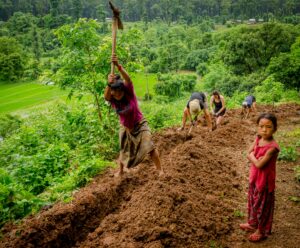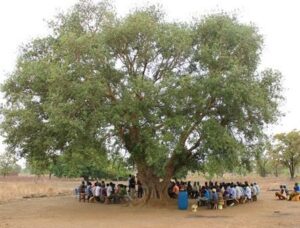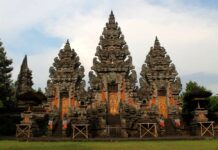Houston, TX (ANS) – Growing up during the 1950 and ‘60s, I heard a lot from my parents and other adults about what life was like during the Great Depression and World War II. Then, during the time I served in the United States Air Force, I had the opportunity of spending time in some lesser developed Asian countries. I discovered that there are numerous people in many countries who have never had life as good as even the worst periods of our history here in North America. Poverty, disease, high mortality rates, (lack of safe water, sanitation and hygiene) all make life really difficult and trying for so many. In reality, trying times are happening all the time, somewhere, for somebody.

The Law of Sowing and Reaping
It’s encouraging to realize that we, as followers of Jesus, can bloom, flourish and be fruitful. That, regardless of our outward circumstances. We should also find comfort in knowing that God is working all thing after His own eternal purposes. The principle of sowing and reaping can motivate us in pursuing His purposes. It is important to keep in mind that we always reap what we sow, after we sow and more than we sow. His Word will not return void, but will accomplish His purposes as we faithfully sow into the lives of others.
In trying times people tend to be more open to the things of God and more aware of their need for Him. However, even in the best of times, many people are dealing with problems and difficulties that may not be apparent. When we are observant and sensitive to the people we interact with, we can expect the Lord will connect us with those who need Him. The Apostle Peter tells us to always be ready to give an answer for the hope that is within us. During this global pandemic we may have more opportunities than normal to be fruitful and multiply our impact for the Kingdom of God.
Being Fruitful and Multiplying

Years ago I had the opportunity of leading one of our neighbors to the Lord. He immediately began to share his testimony with friends, neighbors and family. As a result his sister, a brother-in-law and several other family members came to the Lord. A college student from an Asian country was introduced to Jesus and became part of a Bible study group I was leading at the time. A few years later, he was responsible for translating the first through-the-Bible devotional commentary into the gateway language of the people in his home country. He eventually became a missionary in that creative access country.
A businessman I had the opportunity of leading to the Lord began sharing with others. He led his boss to the Lord and witnessed to a number of his customers. He shared the gospel with his brother in a phone conversation back in his home country in the Middle East. His brother later became a pastor in that nation. These are great examples of how God uses His Word, when it’s presented to those with open and receptive hearts. Even new believers can share their testimonies and the gospel and be instrumental in others coming to faith in Christ.
Impact of Transformed Lives

My father was a pastor for more than sixty years. It has been a delight over the years to come across people who came to the Lord during his many years of pastoring and ministry. Some of those are now pastors, missionaries, church leaders and followers of Jesus in their various professions. We don’t always know the multiplying impact that one transformed life can have over time. However, we do know that God honors His Word, and our most feeble efforts to share what He has done in our lives.
The Word of God still has power to transform lives as it is shared in the power of the Holy Spirit. I can personally testify to that reality and the multiplying influence for His kingdom purposes. It can have a ripple effect and reproducing impact. That awareness should encourage every follower of Jesus, that each of us can be salt and light every day, wherever we happen to be. A simple word of blessing or encouragement is sometimes all it takes to influence someone, and perhaps open up ministry opportunities.
Connections and Relationships
We often say that the Kingdom of God is based on relationships. Of course, our relationship with the Lord is the first and foremost relationship. When we are in a right relationship with our Heavenly Father, the Creator God of the Universe, it makes it possible to have healthy relationships with others and our circumstances. One of the important lessons we’ve learned over the years in our Orality Training experiences is how barriers and differences can be broken down and improve relationships. The training events provide opportunities to hear people’s stories and experiences, and foster more intimate relationships.
We’ve observed how pastors, church leaders and others from different tribal, ethnic or denominational backgrounds can find common ground. The participatory and engaging nature of the training allows for removing barriers and building bridges. The stories, parables and lessons from Scripture of how Jesus related to those of different ethnic and racial differences are universal in their applications. The stories of the Samaritan Woman at the Well and the demon-possessed Gerasene are great examples.

Value in the Kingdom of God
We see how Jesus is a cross-cultural and counter-cultural person. He values all people. A few simple stories from Scripture can be used to communicate many important lessons. Worth and value in the Kingdom of God is a major topic everywhere, and we recognize it’s not based on our abilities, possessions or positions in life. It’s actually based on the price paid for us. That makes all of us VIPs in God’s sight. With a set of stories, and the appropriate pre- and post-story discussion and dialogue, we can find many common themes about relationships. We can think about who Jesus has time for, who He values or who He choose to use for His Kingdom purposes.
An Orality Training Workshop in a Texas church provided a platform for building and enhancing relationships. While the participants had attended the same church together for many years, they discovered how little they really knew about each other. Learning, retelling and discussing the stories in the training opened up conversations for sharing at a heart level they had never done before. Participants shared about the storms of life they had faced, how they related to the story of Nicodemus and being born again, and how God had answered prayer and intervened in their lives. Many breakthroughs came as they interacted with each other and communicated at a deeper and more intimate level.

Back to the Basics
Finding common ground around the life, Spirit and teachings of Jesus allows for overcoming major differences. Connecting, communicating and listening are all vital elements in being fruitful and multiplying our impact for the sake of the Great Commission. There are significant lessons that we in the Western World can learn from the more relational, communal Oral Cultures in the Global South, as well as the Early Church. We are also blessed to have access to modern media and technology that did not exist just a few years ago. The global community of learning and practice is continuing to grow around these simple, but profound, methods and strategies.
Blessings of Modern Technology
With all that is going on in the world these days, we’re discovering more creative and innovative ways of doing missions and ministry. From my laptop, I frequently lead or participate in online training events, webinars and conference calls with people from all over the world. The modern technological and media resources are enabling us to train, equip and mobilize massive numbers of disciple makers everywhere. While we are in a season of social distancing, we can still pray and have conversations. Phone conversations are also a great way of sharing the gospel and even discipling others. Over the years, I have had the privilege of sharing the gospel and leading many to Christ over the telephone. The Lord is giving us many opportunities to be fruitful and multiply in these trying times.
For more information visit – www.water.cc – www.orality.net






